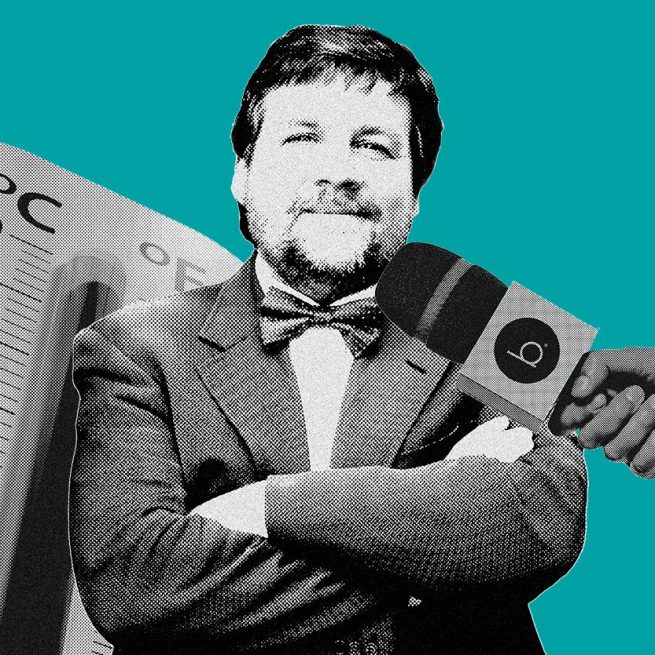Luca Mercalli is a glaciologist and head of the Italian Meteorological Society. We interviewed him for the Blasting News newsletter "It's Not True". He explained why climate disinformation is a danger to democracies and how hard it is to debunk a climate fake news.
Let's start with what happened when you appeared on a Rai 3 broadcast. After you explained the risks of climate change, a journalist told you that where he was in Trieste it wasn't hot, and that therefore climate change did not exist. After noticing that more time was being given to this journalist – who had no expertise in climate science – you left the broadcast. How do we avoid descending into debates and explain to citizens that climate change is a serious problem, and that it is not a matter of opinion but a proven scientific fact?
I think fights on television are useless and only increase confusion among the viewership. The main flaw lies with a culture in journalism that continually allows anyone to opine, even when the subject is a specialized field of study, and express misleading views on topics that have not been the subject of scientific debate for decades. It's as lopsided as comparing an astrophysicist and a flat-earther: we simply know that the earth is spherical.
Period. We don’t recognize a flat-earther’s right to shape the discussion, because all they contribute is disinformation. It is a problem of professional ethics, not democracy. I say this as a science journalist and mentor for my colleagues in the Italian Journalists' Association. It's as lopsided as comparing an astrophysicist and a flat-earther: we simply know that the earth is spherical. Period. We don’t recognize a flat-earther’s right to shape the discussion, because all they contribute is disinformation.
First Covid and now climate change. Why is there all this conspiracy surrounding the topic, despite the fact that all the signs one could ask for – temperatures this summer, increasingly frequent and severe weather events, countless scientific studies… – clearly indicate that human activity is affecting the stability of our planet’s climate?
Climate change induced by human activity has been talked about in the media for at least thirty years, i.e., since the UN conference in Rio de Janeiro in 1992 which brought the climate issue –previously reserved for insiders – to the political and social realm. Denialism and conspiracy theories have always existed. In the early days it was used for discrete economic interests, but today two new causes are fueling it: first is the ease of spreading baseless opinions on the Internet, and second is the anxiety of people who, when they realize that the problem affects them more closely and therefore have to assume responsibilities (which in 1992 seemed far away...), look for all the ways to deny the evidence, fabricate alibis and avoid changing habits.
Broadening this concept, why does this narrative dovetail with populist and broadly right-wing rhetoric around the world?
The climate issue becomes ideological when it affects the economy and the role of state regulation in people's lives.
Why does climate change, which threatens all of humanity, find so little space on political agendas, even though younger activists have devoted considerable energy to it through protest movements?
Fighting the climate crisis never generates political consensus: it requires personal commitments, new taxes, new laws and new controls. And it does not provide immediate tangible results but only in the very long term. So, the politician with a short-term electoral vision avoids it as much as possible.
Young people (but be careful, not all, only a small part) have understood instead that they will suffer the greatest damage if action is not taken in time and for this reason they protest, but they are few and for now they have not obtained results.
How difficult is it to debunk fake news about climate change? Are there any methods and what can we do to defend ourselves? And what is your role as scientists in all of this?
It's difficult because fake news appeals to emotions that are quick, simple and comfortable to understand, albeit wrong, while scientific knowledge takes time to explain and appeals to rational and non-emotional faculties. I usually say it takes a second to spout nonsense and at least an hour to refute it.
And often there isn't an hour in the media... So, whoever spreads lies wins. The methods would be to refer to the authority of the sources, universities, public research bodies, state meteorological services, United Nations bodies, and not to something your friend told you when you went out for drinks. Scientists do what they can, but they are inundated with misinformation or even outright threats and attacks.
One last question. Climate deniers say it has always been hot and all these extremes have happened before the industrial revolution. How would you deconstruct this analysis?
It would take me a long time to respond with scientific arguments to such a superficial statement. I would say: read the climate reports of the IPCC (United Nations Intergovernmental Panel on Climate Change): everyone criticizes them but they have never read a single page!
As a glaciologist - I would say that I can use the incredible retreat of the glaciers in recent years, which has no equal in the history of the last few millennia: the mummy of the Similaun man is 5,300 years old and only came out of the ice in 1991, if it had been hotter in Roman times or in the Middle Ages it would have emerged and deteriorated. With global warming out of control we are at great risk, why continue to believe those who say that everything’s fine?
Translation David Mazzucchi. Massimiliano Mattiello contributed from Rome

